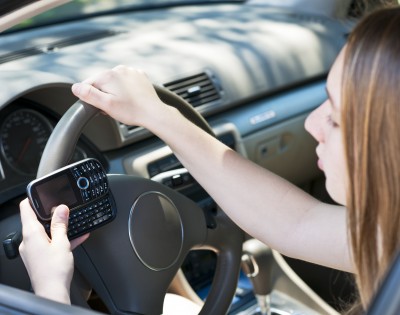Is There a Solution to Completely Control in-Vehicle Texting?
October 17, 2014 | Category: Automobile Accidents | Share44 states, the District of Columbia, Puerto Rico Guam and the U.S. Virgin Island ban text messaging for all drivers reports Distracted.gov. These bans may be either primary or secondary. The primary law means that an officer can ticket a driver for the offense without any other traffic violation having taken place. The secondary laws allows an office to only issue a ticket if the drier has been pulled over for another offense, such as speeding. The state of Florida bans driver texting as a secondary offense.
 The skill of driving requires full attention in order to safely control the vehicle and to respond to quickly-changing events that may happen around the driver. Texting takes the driver's eyes off the road (visual), mind off the road (cognitive) and hands off the steering wheel (manual).
The skill of driving requires full attention in order to safely control the vehicle and to respond to quickly-changing events that may happen around the driver. Texting takes the driver's eyes off the road (visual), mind off the road (cognitive) and hands off the steering wheel (manual).
Since 2000, texting has become very popular and a social norm as most of the cell company plans include text messaging packages. The International Telecommunication Union states that "texting, making calls, and other interaction with in-vehicle information and communication systems while driving is a serious source of driver distraction and increases the risk of traffic accidents."
The National Highway Transportation Safety Administration (NHTSA) statistics are sobering:
- Teens read or send text messages once a trip – 26 times more often than their parents think they do.
- 80% of young drivers think that texting makes no difference to their driving performance.
- 68% of young drivers 18 to 20 are willing to answer incoming phone calls on some, most, or all driving trips.
- 10% of all drivers under the age of 20 involved in fatal crashes were reported as distracted at the time of the crash.
In-vehicle texting is not yet controlled here in Florida yet even though there are been efforts to do so.
The National Transportation Safety Board (NTSB) added distracted driving to its 2013 "Most Wanted List" in November of last year.
In 2009, President Obama signed an executive order directing federal employees to not send text messages while driving government vehicles, or while driving privately owned vehicles when conducting government business.
The Federal Motor Carrier Safety Administration (FMCSA) banned commercial truck and bus drivers from texting while driving in September 2010, and later banned all hand-held cell phone use by commercial drivers in November 2011.
Software companies have been producing applications to prevent people from using phones while in moving vehicles. They are reported to be gaining in popularity. Here are some examples:
• Software that uses on-phone GPS or in-vehicle Bluetooth systems to determine when the vehicle is moving.
• Devices that connect with the vehicle's on-board diagnostics port or integrate into vehicle electronics or infotainment platform, shutting off gadgets while the vehicle is moving. They include Cell control, Cellsafe,Key2SafeDriving and Taser International's Protector.
• Detection, jamming, monitoring and sensors. They include Trinity-Noble's Guardian Angel, which locks the keys of a cellphone when a vehicle is going over a pre-set speed. (Source: USA Today)
AT&T and some of the other cell phone carriers are doing public service announcements on television or in movie theaters to create awareness of the dangers of texting and driving. When you buy a cell phone from AT&T, there is a message pasted to the screen that says:
In addition, AT&T offers a free app, AT&T Drivemode, that, when vehicles are moving 25 mph or faster, sends an auto-reply message to incoming texts, notifying the sender that the recipient is driving. Users manually enable the app before driving, though, so participation is strictly voluntary.
Randall Spivey of Spivey Law Firm says, "Completely solving the in-vehicle texting problem, specifically, and the larger problem of 'Distracted Driving' itself, will happen one person at a time. Each of us must make the decision to stop distracted driving which cause injuries and deaths."
Fort Myers Injury Attorney, Randall L. Spivey is a Board Certified Trial Attorney – the highest recognition for competence bestowed by the Florida Bar and a distinction earned by just one (1%) percent of Florida attorneys. He has handled over 2,000 personal injury and wrongful death cases throughout Florida. For a free and confidential consultation to discuss your legal rights, contact the Spivey Law Firm, Personal Injury Attorneys, P.A., in Lee County at 239.337.7483 or toll free at 1.888.477.4839,or by email to Randall@SpiveyLaw.com. Visit SpiveyLaw.com for more information. You can contact Spivey Law Firm, Personal Injury Attorneys, P.A.in Charlotte County at 941.764.7748 and in Collier County 239.793.7748.

